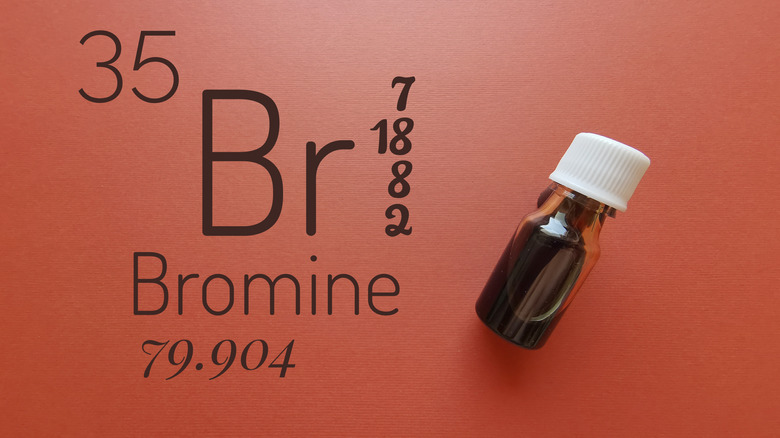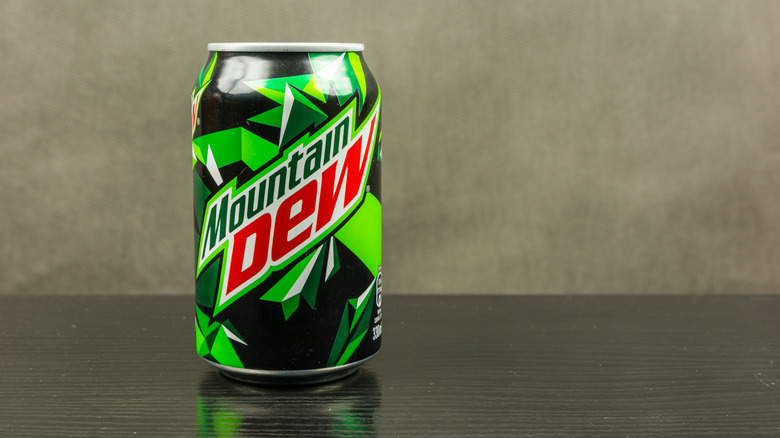The Surprising Reason Mountain Dew Is Banned In Other Countries
The chartreuse beverage, Mountain Dew, may be one of your favorite sodas. Although this soda was originally created as a mixer to accompany bourbon, this lemon-lime drink is often enjoyed on its own. The brand's promotions are usually aimed at young people, who may get excited by taking risks. Commercials often highlight people participating in extreme sports, such as skateboarding, mountain biking, or climbing mountains, and then enjoying a refreshing can or bottle of Mountain Dew.
The marketing may help sell Mountain Dew, but like any soda, it is anything but healthy. In fact, Mountain Dew is known to have a higher level of caffeine than other sodas. A 12-ounce can of Mountain Dew has 54 milligrams of caffeine, while a 12-ounce Coca-Cola has 34 milligrams and a can of Pepsi is 38 milligrams, per the Center for Science in the Public Interest. In the United States, Mountain Dew is easy to find at grocery stores and gas stations, but Mountain Dew isn't available in some countries.
Mountain Dew contains a controversial ingredient
Some of the ingredients in Mountain Dew should raise eyebrows, but are surprisingly permitted in the United States. Yet, each country has different regulations and rules regarding what chemical ingredients and quantities are allowed. If you visited Japan or some countries that make up the European Union in the past, you probably didn't find Mountain Dew on any grocery store shelves because the recipe once included an ingredient that is banned in these countries, according to Stacker. Mountain Dew was made using brominated vegetable oil, or BVO, a food additive, which is considered a controversial ingredient. One of the substances in BVO is bromine, a naturally occurring element that is red and brown with a strong scent similar to bleach that stays in liquid form when at room temperature, according to the CDC.
Although bromine comes from the Earth's crust and can also be found in seawater (via CDC), being exposed or consuming large quantities could pose health risks. "Bromine works by directly irritating the skin, mucous membranes, and tissues," according to the CDC. As if this wasn't sufficient cause for alarm, "bromine can build up in the body and potentially lead to memory loss, as well as skin and nerve problems," per Stacker, but this is usually based on excessive consumption (via the Mayo Clinic).
Brominated vegetable oil is an emulsifier
Makers of Mountain Dew have used BVO for its emulsion properties to ensure citrus oils stay mixed, per USA Today. "Instead of them [citrus oils] kind of coalescing and ringing at the top — forming a film at the top of the soda — they're uniformly dispersed throughout," said Robert McGorrin, a professor of food science and technology at Oregon State University, per USA Today.
Although this food additive may help emulsify liquids, there is still a lack of research on how different quantities can affect the human body. "I don't think it's fully understood about where it [BVO] goes once it passes your teeth, how long it stays in your body and whether it breaks down in your body — whether it creates significant harm to the body or even chronic harm," Christopher Reddy, scientist and bromide expert at the Woods Hole Oceanographic Institution, told USA Today. The Food and Drug Administration (FDA) once listed BVO as a substance "generally recognized as safe," but has since changed it to an interim ingredient (via Snopes).
Drink companies received pressure to make changes
PepsiCo, who makes Mountain Dew, has received mounting pressure to make changes to the ingredients list for some of its products. In 2012, a Mississippi teenager, Sarah Kavanagh, started a petition on Change.org to remove BVO from Gatorade, according to USA Today. By 2014, both PepsiCo and Coca-Cola announced they would remove BVO as an ingredient from various soft drink products and sports drinks, but it did not happen immediately, according to NPR. As of July 2020, BVO is no longer listed as an ingredient in Mountain Dew based on PepsiCo's website. But since these drinks need an emulsifier, the behemoth beverage corporations have simply replaced BVO for another emulsifier. This means you may now see sucrose acetate isobutyrate or glycerol ester of rosin listed on the ingredients list (via NPR).
Like with any soda, if you drink Mountain Dew occasionally, there is likely no cause for concern. The fact that many countries deem BVO as an unfit ingredient to be sold to customers seems to speak volumes that BVO likely should not be in a soda.



